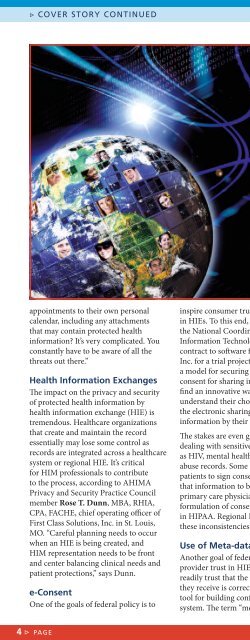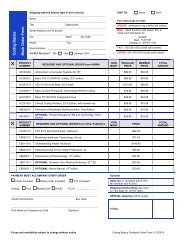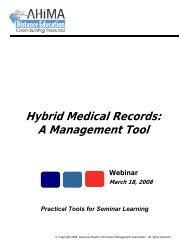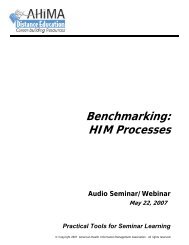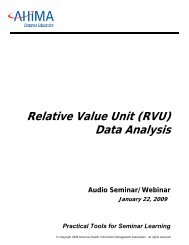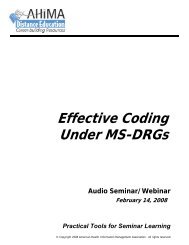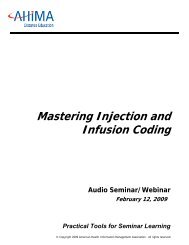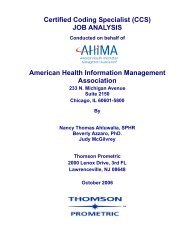AHIMA Advantage - AHIMA Body of Knowledge - American Health ...
AHIMA Advantage - AHIMA Body of Knowledge - American Health ...
AHIMA Advantage - AHIMA Body of Knowledge - American Health ...
You also want an ePaper? Increase the reach of your titles
YUMPU automatically turns print PDFs into web optimized ePapers that Google loves.
▷ COVER STORY CONTINUEDappointments to their own personalcalendar, including any attachmentsthat may contain protected healthinformation? It’s very complicated. Youconstantly have to be aware <strong>of</strong> all thethreats out there.”<strong>Health</strong> Information ExchangesThe impact on the privacy and security<strong>of</strong> protected health information byhealth information exchange (HIE) istremendous. <strong>Health</strong>care organizationsthat create and maintain the recordessentially may lose some control asrecords are integrated across a healthcaresystem or regional HIE. It’s criticalfor HIM pr<strong>of</strong>essionals to contributeto the process, according to <strong>AHIMA</strong>Privacy and Security Practice Councilmember Rose T. Dunn, MBA, RHIA,CPA, FACHE, chief operating <strong>of</strong>ficer <strong>of</strong>First Class Solutions, Inc. in St. Louis,MO. “Careful planning needs to occurwhen an HIE is being created, andHIM representation needs to be frontand center balancing clinical needs andpatient protections,” says Dunn.e-ConsentOne <strong>of</strong> the goals <strong>of</strong> federal policy is toinspire consumer trust and confidencein HIEs. To this end, the Office <strong>of</strong>the National Coordinator for <strong>Health</strong>Information Technology has awarded acontract to s<strong>of</strong>tware firm APP Design,Inc. for a trial project. They will designa model for securing electronic patientconsent for sharing information and t<strong>of</strong>ind an innovative way to help patientsunderstand their choices related tothe electronic sharing <strong>of</strong> their healthinformation by their healthcare providers.The stakes are even greater whendealing with sensitive information suchas HIV, mental health, or substanceabuse records. Some states requirepatients to sign consent forms allowingthat information to be shared with aprimary care physician; this is a stricterformulation <strong>of</strong> consent than is containedin HIPAA. Regional HIEs must addressthese inconsistencies across state lines.Use <strong>of</strong> Meta-data TagsAnother goal <strong>of</strong> federal policy is to inspireprovider trust in HIE, so clinicians willreadily trust that the health informationthey receive is correct. Metadata is onetool for building confidence in the HIEsystem. The term “metadata” is <strong>of</strong>tenused to mean “data about data”—datathat provides more information ordetail about a piece <strong>of</strong> data. The federalgovernment is evaluating a minimal set<strong>of</strong> standards for metadata that couldbe attached to a summary care record.Say a patient wants to download theirhealth information from their healthcareprovider’s patient portal to their personalhealth record (PHR). When a patientshares a PHR with a new clinician,attached metadata could help ensure thatthe data belongs to this patient.Three main categories <strong>of</strong> metadata arebeing considered. Patient identitymetadata is the necessary data requiredto uniquely select a patient from apopulation with a guaranteed degree <strong>of</strong>accuracy. Provenance metadata is datathat provides information on a dataset’shistory, origin, and modifications.Privacy metadata is the data that couldbe used to convey and communicatepatient preferences (permissions orlimits) associated with the sharing <strong>of</strong> hisor her health information.Unique Patient Identifier<strong>AHIMA</strong> recommends the use <strong>of</strong> a uniquepatient identifier to be included in thecore data elements <strong>of</strong> the master patientindex. The unique patient identifiersupports the privacy, security, andconfidentiality <strong>of</strong> protected patient healthinformation because it can help protectconfidentiality <strong>of</strong> patient informationand identify those who violate patientconfidentiality. A recent ANSI reportaddresses this privacy safeguard. Amongthe report’s findings: at least 12 stategovernments have begun investigatinguse <strong>of</strong> unique patient identifiers.<strong>AHIMA</strong> ResourcesWant to learn more about these and otherprivacy and security issues? Visit ahima.org/advocacy/arraprivacy.aspx and ahima.org/resources/psc.aspx to find informationthat can help you be more effective atyour job. If you’re interested in becominga credentialed privacy and securityexpert, look for the upcoming Certifiedin <strong>Health</strong>care Privacy and Securitycredential (CHPS) Exam Prep workshopOctober 4–5 in Chicago (the April 19–20workshop is sold out). v4 ▷ PAGE<strong>AHIMA</strong> ADVANTAGE


